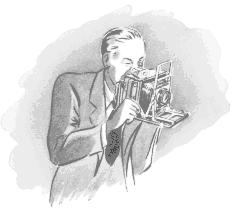| View previous topic :: View next topic |
| Author |
Message |
pv17vv
Joined: 22 Dec 2001
Posts: 255
Location: The Ardennes, Belgium
|
 Posted: Wed May 28, 2003 8:12 pm Post subject: Posted: Wed May 28, 2003 8:12 pm Post subject: |
 |
|
Does someone know what kind of film was used by Signal Corps Combat photographers in their Speeds, AD 1944 on ETO ?
A good friend of mine tries to identify the wreck of a Luftwaffe plane shot somewhere in France but the markings appear confusing even to experts, so he asked my opinion about the possibility of being misled by the poor reproduction of red/orange in case an orthochromatic film was used.
I told him this was a very interesting question 
In other words : I have NO idea !!
Thanks.
Georges, Belgium
|
|
| Back to top |
|
 |
RichS
Joined: 18 Oct 2001
Posts: 1468
Location: South of Rochester, NY
|
 Posted: Wed May 28, 2003 8:29 pm Post subject: Posted: Wed May 28, 2003 8:29 pm Post subject: |
 |
|
I don't know either  But I haven't posted in a while and thought I'd offer an opinion before someone who actualy does know posts... But I haven't posted in a while and thought I'd offer an opinion before someone who actualy does know posts...
I would guess that Ortho film was used. It was faster and very popular. (did they have pan film in '44?) Besides, the aero lenses I have seen were pretty much set up for B&W shooting, complete with red and/or yellow filters. So even if Ortho film wasn't used, there's a good chance the shot was taken through a red/yellow filter anyway to cut aerial haze...
_________________
----------------------------------------
"Ya just can't have too many GVIIs" 
---------------------------------------- |
|
| Back to top |
|
 |
Les
Joined: 09 May 2001
Posts: 2682
Location: Detroit, MI
|
 Posted: Wed May 28, 2003 8:50 pm Post subject: Posted: Wed May 28, 2003 8:50 pm Post subject: |
 |
|
Was the photograph taken on the ground and thus a Signal Corp Speed Graphic used, or was the photograph taken from the air? If it was shot with an aero camera, then Rich is right, it was probably ortho film or pan film with a red or yellow filter (haven't seen an orange one yet)
I have a Verichrome film pack dated '43 and it is NOT Verichrome PAN. But that doesn't mean much in itself.
>>>>>>>>This just in over the wire<<<<<<<<<
While I haven't found a military book stating exactly what the troops had, Tri-x Plus-x, Super-XX, Super Panchro were all available and all Panchromatic. Tri-x was not available in packs.
there was also Ansco film, which was a US made film based on Agfa's formulas.
[ This Message was edited by: Les on 2003-05-28 17:18 ] |
|
| Back to top |
|
 |
pv17vv
Joined: 22 Dec 2001
Posts: 255
Location: The Ardennes, Belgium
|
 Posted: Thu May 29, 2003 8:17 am Post subject: Posted: Thu May 29, 2003 8:17 am Post subject: |
 |
|
The pics were taken on the ground and show US troopers peering inside the cockpit of a downed Focke-Wülf. It is precisely ID stripes supposed to be yellow and red that cause the problem. One of them appears over-exposed by a hot sun and shadows are heavy.
Thanks for your interest.
Georges |
|
| Back to top |
|
 |
emile
Joined: 12 Jul 2006
Posts: 3
Location: France
|
|
| Back to top |
|
 |
ImageMaker
Joined: 20 Jun 2006
Posts: 93
Location: North Carolina
|
 Posted: Sat Jul 15, 2006 2:42 am Post subject: Posted: Sat Jul 15, 2006 2:42 am Post subject: |
 |
|
Ortho films *were* still in use -- Verichrome wasn't replaced by Verichrome Pan until the 1950s. OTOH, as already suggested, panchro emulsions were quite common before the War; I've seen (photos of) packaging for panchro plates dated from the 1920s, and tri-color images that had to have been made on at least partly panchromatic emulsion in the 1899-1904 time frame.
IF the film was ortho, deep red (like that in a French roundel) would record as if very dark, probably similar in tone to the deep blue used in the American insignia. Shades of yellow and orange would vary depending exactly how the color was produced, but should show in varying shades of gray, always darker than a similar value green.
_________________
Is thirty-five years too long to wait for your first Speed? |
|
| Back to top |
|
 |
|


